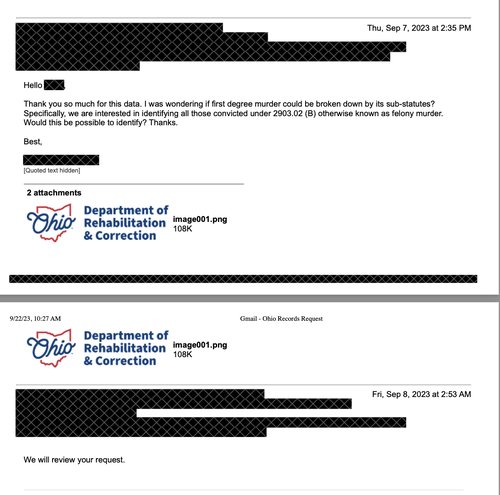DataOhio
Inadequate Data
to perform any analysis.
| Request Responsiveness | |||||
| Financial Accessibility | |||||
| Timeliness | |||||
| No Residency Required | |||||
| Appeal Responsiveness |
*These factors track the process--i.e. the effort and obstacles--for obtaining data from individual states under the Freedom of Information Act (FOIA) request and appeals process. These factors do not measure the quality of the data; only the process of attempting to obtain the data.
Data Status
-
223
days to respond to our FOIA request.
Ohio took 223 days to respond to our FOIA request and provided us with a spreadsheet detailing individual-level data for all incarcerated persons in Ohio prisons on July 1, 2023. Ohio’s statutes, however, are not specific for felony murder. Although we attempted to use publicly available web portals to identify individuals incarcerated under felony murder, as in most other states, Ohio does not have a statute specifically codifying felony murder, which would make it easier to identify and isolate felony murder conviction data. Instead, as in most other states, felony murder is defined within its other murder statutes and the publicly available conviction and sentence information did not distinguish felony murder from other murder convictions.
We asked the DOC for further clarification and they responded with, “I am sorry, the data does not exist in our system in the manner you have requested. Therefore, we will not be able to assist you in this matter.”
Fifteen requests over seven months. And then: "We met on this Friday. I am sorry, the data does not exist in our system in the manner you have requested. Therefore, we will not be able to assist you in this matter."
Legal Overview
In Ohio, felony murder is defined in the first degree murder (Ohio Rev. Code Ann. § 2903.02), capital murder (Ohio Rev. Code Ann 2903.01) and manslaughter statutes (Ohio Rev. Code Ann. § 2903.04).
Prosecutors can charge and convict any person of murder without having to prove that they intended to cause another person’s death. Prosecutors must only prove that a person committed another specified felony and that a death occurred. Prosecutors can prove murder even when the death was caused by a third non-party (i.e. neither the person nor any accomplice).
A conviction for felony murder carries a maximum sentence of 15 years to life.
Access the Data
Learn more about how you can contribute to transparency when it comes to felony murder.






